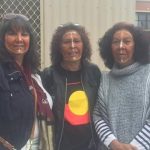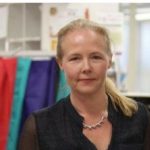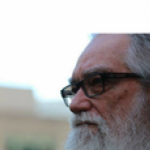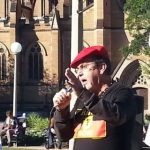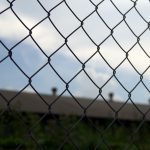Aboriginal Justice: An Interview With Inside Out’s Keenan Mundine
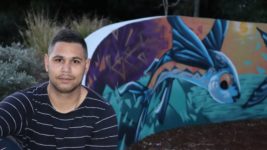
Aboriginal Justice campaigner Keenan Mundine recently addressed the UN Human Rights Council (UNHRC) in Geneva. He called on the leading human rights body to demand that the Turnbull government raises the age of criminal responsibility in this country.
Currently, Australian authorities are detaining children as young as 10 in youth justice facilities. The practice of criminalising kids, who should be in primary school instead of solitary confinement, puts this nation out of step with the overwhelming majority of countries around the world.
“This year alone around 600 children under the age of 14 will be taken from their families and their communities and locked up,” Mr Mundine outlined at the UN meeting. “Most of these children are Indigenous like me.”
A 2018 Amnesty International report on human rights revealed that Indigenous children are 25 times more likely to be imprisoned in Australia than non-Indigenous children.
Sparked by the barbaric practices at Don Dale youth detention centre, the Royal Commission into the Protection and Detention of Children in the NT recommended that the age of criminal responsibility be raised to 12 and that children under 14 should no longer be incarcerated.
Institutionalised racism
Another primary focus for Mr Mundine is lowering Indigenous incarceration rates. Despite the 1991 Royal Commission into Aboriginal Deaths in Custody recommending that imprisonment be used as a last resort, the number of Indigenous people being detained in this country has skyrocketed.
There were 11,737 Indigenous adult inmates being detained in Australian correctional centres in March, which means Indigenous people account for 28 percent of the adult prisoner population, whilst First Nations people only make up 2.8 percent of the country’s entire population.
And the figures for children on the inside are even more disturbing. A recent NT Estimates Committee hearing revealed that 100 percent of children being held in detention in the NT are Aboriginal. And in March this year, 47 percent of children detained in NSW were Indigenous.
Creating new pathways
Mr Mundine understands the system all too well. After losing both his parents at an early age, he ended up being sent to a detention facility when he was 14. And from there he got caught in a cycle of being released from prison, reoffending and being sent back to gaol for many years.
But, an offhand joke made by two Goulburn prison inmates about serving a life sentence between them made Mundine realise he had to change. Today, the Biripi and Waka Waka man provides vital support services to Aboriginal youths, ensuring they don’t go down that same path.
Established last year, Inside Out Aboriginal Justice Consultancy is an Aboriginal owned and led firm dedicated to providing solutions for Indigenous people to prevent any future involvement with the criminal justice system. Mr Mundine is the owner of and principal consultant at the firm.
Sydney Criminal Lawyers® spoke with Mr Mundine about the need to raise the age of criminal responsibility, the difficulties he faced when being released back into the community and how it feels to have the opportunity to guide young people in the right direction.
You recently called on the UN Human Rights Council to demand that the Australian government raise the age of criminal responsibility.
Keenan, what effect is the Australian government’s policy of locking up children as young as 10 years old having, especially upon Aboriginal and Torres Strait Islander communities?
We’re taking these young people away from loved ones and community that are supposed to nurture this young person and give them the best skills and tools to navigate their teenage years.
So, we’re taking these children, as young as 10, away from these people and putting them in institutions, around strangers who don’t know these people or their circumstances. They don’t know the myriad of problems this 10-year-old is undergoing in their personal life. They’re not equipped with the skills and knowledge to be able to support these young people.
They’re taking these young people away from their own communities and country, and away from their families, and they’re not giving them any support or skills to regulate what is going on around them. It’s exposing them to a whole new world that no 10, 11, 12 or 13-year-old child should be exposed to.
Then they’re sent back out into the community broken, having been exposed to an institution that now is probably going to be housing and facilitating these children until they are 18.
These young people are going to these institutions at 10 years old and being housed with older teenagers, who behaviour in certain ways. And when you’re in these institutions, you have to adapt as a 10-year-old, and you pick up these traits and look up to these guys.
It’s not a pretty place when you go to juvenile detention. It’s not a place where they take young people and support them and help them grow.
This is supporting the oppression and criminalisation of people at a young age. It’s high policing poor socioeconomic communities.
What other communities lock up 10-year-olds? And in what other communities do 10, 11-year-old children come in contact with the police?
Aboriginal and Torres Strait Islander children are nine times more likely to be removed from their families, than non-Indigenous children.
The 2018 Productivity Commission report revealed that the number of First Nations children in out-of-home care nationally was 17,644 in June last year. And NSW had the highest number of removed Indigenous kids, with 6,824 removed from their homes at the time.
You’ve pointed to the link between children being placed in out-of-home care and coming into contact with the criminal justice system in later life.
Can you expand on how removing children from their homes leads to incarceration?
The young people in the out-of-home system, who are under the supervision of Family and Community Services (FACS), have had their home and community deemed unsuitable. This means that their mum or dad are putting them at risk and not prioritizing their needs.
We know that a child has been taken out of a home and placed in care, because his immediate caregivers or guardians cannot provide for him and may be in contact with the justice system.
So, how do we support this young person now, who may have a mother or father engaged with the criminal justice system, not to follow that path?
We’re removing them at such a young age and we’re not supporting these children to equip them with the skills to be the best adults they can be. That would be around the trauma, and early exposure to violence and drugs and alcohol.
These are key indicators that project Aboriginal and Torres Strait Islander people towards the criminal justice system at a young age.
You’re calling for an overhaul of the criminal justice system and a lowering of Indigenous incarceration rates. What do you see as the most urgent reforms that need to take place in order for a more equitable system to be established?
The most important reform is raising the age of criminal responsibility to 14. Another issue is around people with criminal records trying to obtain work. When you’re applying for a role and you tick the box stating that you have a criminal record, it’s 90 percent likely that nobody is going to hire you.
The wider community needs to support these young people in turning their lives around. I had a lengthy involvement with the criminal justice system, so this is why I am advocating for a reform around people with criminal records working and taking a common sense approach around it.
It’s about supporting not just the employees with a criminal record, but also the employers, so they can understand what sort of criminal record a person has and how much of a risk it would be to take them on.
It’s about supporting the employee and the employer. That way we can involve people like myself with lived experience in mentoring young people in the out-of-home care sector or early intervention and prevention programs to divert people from the criminal justice system.
We also need reform around the Bail Act, because we know a lot of Aboriginal and Torres Strait Islander people breach justice and supervision orders, which keeps them in the criminal justice system.
You were first imprisoned at 14 years old. And you were in and out of gaol until your mid-twenties. On most occasions, when you were released, you didn’t own a birth certificate or have a place to stay.
What sort of options did this leave you on release? And were there support services available to help a person in your position make the transition?
At the time I came into contact with the criminal justice system – the early 2000s – I had no form of identification. And to be eligible for a government benefit I needed a Medicare card or a birth certificate. But the Catch 22 was for you to obtain a Medicare card back then, you needed a birth certificate and vice versa.
I see working in the sector with people coming out of prison, and supporting people in the community, that it’s a lot easier to obtain one of those documents now, which makes that journey a lot smoother. To get their birth certificate now they need as much information as they can get certified by a JP, and you can use criminal records.
My journey was made really difficult. After coming out of prison without a birth certificate, I tried to get one about three times. It took me about three days each time, so nine days all up.
Every time I’d tried, I spent two full days and on the third day I gave up because I was homeless and had no money and I couldn’t wait around. The men who were trying to support me at the time could only give me two or three hours a day, and then they’d clock off and go home.
It was really difficult given the chaos and the circumstances of my life. Three days without money in my pocket was really difficult, because there were people around me that were so involved in the criminal lifestyle that they went through a lot of money in that time. For me to say no to being engaged in that activity to get money was really difficult.
The support wasn’t structured enough, or understanding enough, of my needs outside of the identification. That was just the tip of the iceberg.
At the moment, there are a lot of young people in similar circumstances. They have limited resources and knowledge of services, so they continually stay trapped in the cycle of recidivism and drugs and alcohol.
Because of the lack of cultural understanding and knowledge of my situation, there was nowhere to start. I had no family. I was homeless. I had no bank account. I had no means of money. I had nothing.
What do you do with a 16-year-old kid who just got released from detention when they present in front of you, and you clock off at 5 o’clock?
Now, they’ve learnt a lot from these lessons and they’re more equipped. I’m able to help services understand from a lived experience the point of view of a young person and what is happening in their life.
Even if they’re not articulate enough to be able to tell them, I can speak on behalf of them and tell them what it is like to live on a day-to-day basis without a job, money or support.
Well, that leads me to my next question. Today, you’re the owner of and principal consultant at Inside Out Aboriginal Justice Consultancy.
What does the work carried out by your firm involve? And what sort of programs are you running at present?
At the moment, we have a range of partnerships, initiatives and activities. One was documented last night on NITV The Point. It’s a project I work on with a partner of mine Samey Minkara called Street Smart. He runs and operates a not-for-profit called Street Industries.
We operate on Saturday nights in inner city Sydney in Glebe and Broadway. We target young people out on the street. And it’s a detached youth work model: early intervention and harm minimisation. It targets young people that are unsupported on the street.
I hang out with them from about 4 o’clock until about 11. We just have a game of basketball and have a barbeque and a feed. We just hang around in the community and provide these guys with an alternative activity that they don’t have to have any money for.
Another partnership that Inside Out and my partner Carly – my wife is a co-owner and co-consultant – has is with Shine for Kids. We work with them and they provide a service for young people in the juvenile justice system here in NSW.
We make sure that it is culturally safe and competent to be able to support the young people accessing their services who are Aboriginal and Torres Strait Islander youth. I’m also on a research advisory board for them.
We have a partnership with an out-of-home care provider. We work with young Aboriginal people in the out-of-home care system. They have a residential care program and casework program. They have a couple of Aboriginal kids at the moment.
And as of next week, I’m going to initiate a pilot program, where I’m going to deliver a grassroots mentoring to some of the young Aboriginal people in their care, who have a father or mother in prison.
I’m an ambassador for Prison Songs, the musical documentary that was filmed in the Northern Territory a couple of years ago. It’s all footage from inside a prison up there. People tell their stories and talk about the use of drugs and alcohol in their communities. It was filmed by Kelrick Martin.
And I’m also an ambassador for Just Reinvest NSW. We call on the government for funds for early intervention and prevention, and pre and post release services in the community. Through the Change the Record campaign we share key strategies about lowering Indigenous incarceration rates and involvement in the criminal justice system.
So, your work involves mentoring and counselling Indigenous youths to ensure they don’t end up behind bars.
What it’s like being able provide these young people with the support that you lacked when you were younger?
I’m humbled to be able to sit in front of these young people and tell them my unique journey and basically help support them navigate a different narrative to mine. I support them in staying in school and keeping them connected to their community and their culture.
It’s about helping them navigate peer pressure and the trauma that we share. It’s the common exposure that a lot of Aboriginal people – particularly those in the out-of-home sector – share of being exposed to risky behaviour as young people, whether that be drugs and alcohol, domestic violence, police kicking in the door or being malnourished.
Being able to connect with them on that level and give them the skills to be confident about who they are, is a blessing for me.
And lastly, Keenan, when you addressed the UNHRC, you pointed out that in joining the council “the Australian government promised to champion the rights of Indigenous peoples.”
Given the high Indigenous incarcerations rates in this country, along with the rates of child removals and continuing Aboriginal deaths in custody, what do you think about the government’s pledge to focus upon Indigenous rights?
I specifically stressed the importance that as long as these rates and the paths for First Nations people continue to head where they’re going now, these promises will be hollow.
They will be hollow while we continue to be imprisoned at such a rate and locked up at such young ages.
They will be hollow until they involve Aboriginal people at the forefront of the support services for Aboriginal people who are involved in the criminal justice system and coming out of it.
We will not see a turn around until we involve Indigenous people and give them a voice to be able to support their own people and they’re own communities.
So, it’s time to do something innovative and creative.


